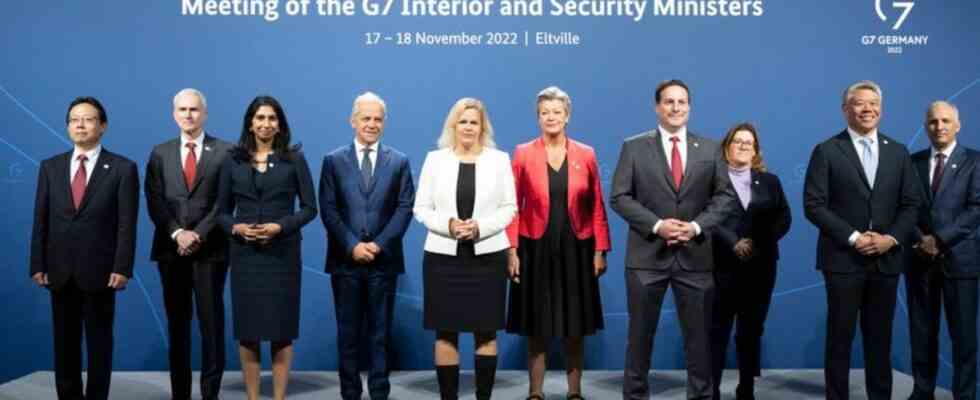Internet
G7 countries want to step up fight against child abuse
The meeting of the G7 interior ministers in Eltville. photo
© Boris Roessler/dpa
Children and young people should be better protected against acts of abuse. A survey shows something questionable: adults are increasingly contacting them on the Internet, asking to meet up, sending naked pictures.
According to Interior Minister Nancy Faeser, the economically strong democracies of the G7 want to step up the fight against child abuse.
The threat to children from sexual violence and human trafficking has increased massively in recent years – especially online, said the SPD politician after a meeting with her G7 counterparts in Eltville, Hesse. A current survey of children and young people makes the need for action clear: they are increasingly being contacted on the Internet by adults with sexual intentions.
More cases of cyber grooming
In October 2022, 2002 boys and girls between the ages of 8 and 17 were surveyed by the “KB&B Family Marketing Experts” institute. Questions were asked about cases of cybergrooming – contact by adults with minors with sexual intentions. 24 percent of those surveyed had already been asked to make an appointment online by adults. This is a significant increase: when the survey was carried out a year ago, it was still 20 percent.
The survey of younger people in particular indicates a worrying development: 20 percent of the eight and nine-year-olds surveyed were asked to make an appointment, and 10 percent were sent unsolicited nude photos, as can be seen from the survey of 377 boys and girls in this age group. Just over a year ago, 9 and 7 percent of eight- and nine-year-olds, respectively, said so.
Additionally, 19 percent of 10-12 year olds (690 respondents) were contacted online by people claiming to be a photographer, talent scout or modeling agent urging to meet. Last year it was 10 percent.
47 percent of the secondary school students were asked to make an appointment, 42 percent were promised something in return for a photo or video by an adult online contact. Among high school students, 19 and 15 percent respectively had this experience.
Tobias Schmid, Director of the Media Authority of North Rhine-Westphalia, said: “It is urgent that we educate children and young people and offer them practical help.” According to the survey, two-thirds of them would like the topic of cybergrooming to be dealt with more at school.
International law enforcement cooperation
Faeser also drew attention to the “live streaming” of acts of abuse on Friday. “More cruel crimes against children can hardly be imagined,” she emphasized. The perpetrators mostly acted transnationally. International cooperation in law enforcement is therefore key.
The G7 states agree to intensify the fight against these crimes. “Technology companies, platform operators and the financial sector also have a clear obligation to act here,” said Faeser. The G7 association of economically strong democracies includes the Federal Republic of France, Italy, Japan, Canada, the USA and Great Britain. Friday was the United Nations Global Day of Action to Combat Child Sexual Exploitation and Abuse.

